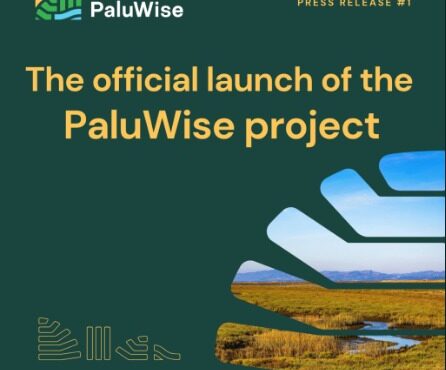
PaluWise project launches to advance solutions for productive use of rewetted degraded peatlands
-
Peatlands
A new EU-funded project, PaluWise, is dedicated to the sustainable use of rewetted degraded peatland ecosystems. Through four large-scale demonstration sites across Europe, PaluWise will showcase and validate best practices in paludiculture, transforming degraded organic soils into thriving, productive landscapes.
Coordinated by Natural Resources Institute Finland (Luke), the PaluWise consortium brings together 18 partners from eight European countries, each contributing to the paludiculture value chains. The project will run for four and a half years, and it has been granted approximately €10 million in Horizon Europe funding.
Scaling up best practises in Europe
In 2024, the EU Environment Council adopted the Nature Restoration Law, which cites paludiculture as a viable restoration measure. The EU Nature Restoration Law, alongside related legislation, mandates the restoration of 30% of drained peatlands in agricultural use by 2030, of which at least a quarter shall be rewetted. By 2050, 50% of such areas shall be restored of which at least a third shall be rewetted. Paludiculture, a farming practice on rewetted peatlands, is seen as a key tool for achieving these targets and offering many co-benefits including climate change mitigation, biodiversity, and water management.
“Paludiculture has the potential to support the EU’s climate targets and biodiversity strategy while providing farmers and landowners with an income, but only if the practice is scaled up”, comments PaluWise coordinator Päivi Merilä from Luke.
The PaluWise project is working closely with local stakeholders to advance field-scale paludiculture through four demonstration sites located in Finland, Poland, the Netherlands and the United Kingdom. These sites focus on developing value chains based on promising wetland crops: Downy Birch, Reed, Sedges, Typha, and Reed Canary Grass.
The project will provide stakeholders, including landowners, policymakers, businesses and communities, with the knowledge and tools needed to embrace paludiculture as a sustainable and impactful land management strategy. Recommendations for the large-scale development of wetland farming across the EU will also be published.
“The aim of this project is to establish paludiculture as a meaningful and widely recognised farming system in Europe”, Merilä says.
Paludiculture stands for the productive land use of wet and rewetted peatlands that preserve the peat soil and thereby minimise carbon dioxide emissions and subsidence.
